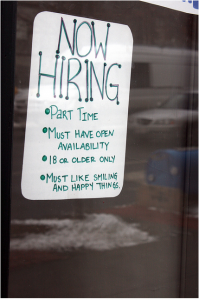Category Archives: Curation
Veterans Struggle to Find Work
Returning vets have a harder time finding work than their civilian counterparts.
IBM Starts Public School P-Tech, Focused on Job Preparedness
The new high school will focus on teaching STEM for job preparedness, include free associates degrees and open arms from IBM when graduates look to become employees. Still, a lot can happen in six years before the first graduates come knocking, especially since the corporate track records in public education are spotty…more
Let’s Face It, Freelancers
The media revolution is underway and we are caught up in it.
It’s time to rethink our approach to jobs. As Zara pointed out below, the “millennial” generation (and the rest of the world) is struggling to figure out how to survive and fit in to the modern economy. Job stability is hard to find, especially within rapidly changing professions, including, but not exclusive to journalism.
A steady gig at the Washington Post, or at the print Seattle Post-Intelligencer? Forget about it. But for the stubborn there is always the freelance option – and freelancing is not just for journalists. Some say that restructuring our approach to freelance jobs is essential to the future of the American economy.
If Sara Horowitz is right, and she’s written about this before, the changing nature of our economy means many workers in the future will be working flexible schedules. Our current social safety net has no provisions for independent workers, already 42 million strong in the workforce.
That number is shocking, and provisions to protect independent workers are needed. But is the transition to a freelance economy a bad thing?
Maybe we don’t need to punch in at 9 and punch out at 5 anymore. After all, doesn’t the quality of work matter more than the hours put in? Flexible scheduling can improve worker satisfaction, which in turn improves productivity. Unhappy workers do a poor job, while happy ones are often more productive and better able to come up with new ideas.
Perhaps an organized freelance economy is in the future for us, health benefits and all. Maybe we would all be happier, more productive employees if so.
On the other hand, it could come down to this (or to SEO headline generator):
(video by No Media Kings)
Revised Headline: Freelance Jobs And The Economic Future
More Jobs: At What Cost?
As President Obama prepares to address the nation on Thursday concerning the struggling jobs market, many are concerned that he is overlooking societal and environmental concerns in favor of boosting the economy.
David Wessel explains the multi-faceted approach we can expect to hear from President Obama, specifically lowering the unemployment rate through a series of tax cuts and plans to improve our nation’s infrastructure.
Other commentary suggests that his speech is more political, as he tries to convince voters that he can deliver results and work with both parties in order to succeed. This willingness to cooperate (or give in, some say) is evidenced by his measure to loosen environmental policy that some say hinder job growth. Paul Krugman examines some of the environmental concerns that go along with job creation.
An example of bypassing health concerns in favor of job creation is the new plan for natural gas drilling of Marcellus Shale in Albany. Detractors say the governor is “fast-tracking” the drilling process without conclusive information on its effect on drinking water in the state.
As the Republican debates heat up, a lot of attention is being directed to current Texas governor Rick Perry, who often takes responsibility for the state’s low unemployment figures.
Paul Osterman took a closer look at the job growth that Perry helped create in the Rio Grande Valley, where employment has risen more than 40% in the last decade. After conducting extensive research in the area, he found that many of the jobs are extremely low-paying, leading to an overall decline in quality of life in the area.
We’ll have to see what kind of impact the disregard for public well-being will have on the nation after our economic situation has recovered.
UPDATED HEADLINE:
Obama to add jobs, but at what cost to the environment and society?
How the other 9.1% lives – Documenting stories of unemployed
The U.S. Labor Department August jobs report for August showed overall U.S. job growth at a standstill.
According to the report, nearly every category of worker – adult men, adult women, teenagers, whites, blacks, Hispanics – showed little or no change in employment for August.
One worker category that did experience growth was involuntary part-time workers, those working part-time because they can’t find a full-time job or because their once full-time hours were cut. Involuntary workers added 400,000 to its ranks, growing the number of Americans forced to work part-time to 8.8 million workers.
With the grim outlook of not only finding work but finding enough work, many media outlets are spotlighting the stories of the unemployed and underemployed.
On the same day as the release of the August jobs report, the New York Times ran a article aptly-titled “Journey of a Jobless Man”, recounting the cycle of disappointment and hope for Frederick Deare, a 53 year old forklift driver toiling through 290 days of unemployment.
In mid-August, the Washington Post launched an interactive project called Help Wanted, anchored by six diverse unemployed people blogging about the emotional and professional struggles of looking for work. Help Wanted also allows readers to submit video and audio testimonials to questions like “What did you tell your kids when you lost your job?”
An interview with an unemployed American talking to RT America earlier this month about his struggle to be hired for work of any kind, including fast food, emphasizes the bleak job situation the unemployed face.
These stories vividly show the plight of the unemployed in names and faces rather than just as statistics.
New Headline: Documenting unemployment stories in the media
Job Creation: Quantity v. Quality?
The U.S. Labor Department released its August jobs report on Friday. The news for American workers was worse than expected. The U.S. added zero jobs in August, making this one of the worst job reports since the Labor Department began keeping records in 1939.
The report also showed that the number of involuntary part-time workers, people who’ve had their hours cut or who’ve been unable to find full-time positions, rose from 8.4 to 8.8 million people. NPR takes a look at the real-life impact of this trend in its yearlong series “The Road Back to Work.” All six of the St. Louis residents profiled in the series have found new jobs since being laid-off, but four of them are working in temporary or part-time positions.
On Gainful Unemployment
You can quit your job during the recession; if you have a really good reason.
U.S Jobless: Not China’s Fault

A job fair last week in Los Angeles. Companies are not laying people off, but hiring is often rare. (from New York Times)
The White House released a recent job report on last Friday, September 3rd, that the unemployment rate in the United States is expected to remain 9 percent through 2012, the next presidential election year. New York Times believes “it’s a signal that the economy has stalled and that inaction by policy makers carries substantial risk“.
Though this is the business inside the United States, it did bring a shock to the global stock markets in the following days. According to Los Angeles Times, Asia’s stock market took a tumble on Monday, the first day of trading after last week’s bleak U.S. jobs report, followed by the volatile Eurozone market, largely because of the fears that the U.S. is sliding back into a new recession after 2008. A report from Wall Street Journal even called this September as “historically the worst month on calendar for stocks“.
What’s more interesting is, however, some people criticize that China is the main cause of the jobless situation in the U.S.. Joe Green, president and CEO of NPRC, blamed China as “luring U.S. manufacturers to their mainland, stealing our discoveries and inventions, and trained their students in America’s elite universities”. He also provided five suggestions to Congress, including giving priority to buy American products, to help getting out of China’s “nightmare”.
COME ON! Be realistic! We are the one freaking out that we may not be able to get our money back!
What’s that major worth?
Each month, the New York Department of Labor issues a paper newsletter entitled Employment in New York State, summarizing unemployment trends for the state. August’s report (PDF) included a particularly interesting feature article entitled “What’$ That College Degree Really Worth?” (Their spelling.) It summarizes a new study from Georgetown University’s Center on Education and the Workforce that, for the first time, clearly shows the earning potential of certain majors versus others.
On the other hand, Peter Thiel argues that college is completely pointless if you’re interested in starting a new venture, and he’s put money into the game. Thiel (at right) is the PayPal co-founder and venture capitalist who’s giving 24 college kids $100,000 each to drop out of school and start their own businesses. Bloggers and commentators immediately criticized him, not only because he himself earned degrees at Stanford, but because his selection criteria of the best-and-the-brightest is essentially cherry-picking from those students talented enough to have gotten into the top schools at all.
Finally, professor Bill Linn of George Perkins Marsh Institute at Clark University makes this useful observation about the study:
This study says nothing about the personal and political values of less remunerative majors, quality of life, or vast differences of individual economic and social circumstances. Use this information to help you think about, not make, your choices about a major.
Sage advice, perhaps, for those of us who have given up a more lucrative (salary-wise) career to enter the field of journalism and communications.
(Potential headline optimized for SEO: “Salaries Highest for Computer Science and Engineering Graduates” or “Computer Science, Engineering Top List of High-Salary College Degrees”)


